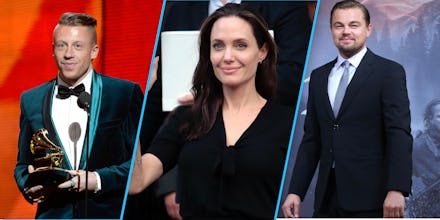One Brutal Truth Every White Ally Needs to Hear About Racism and White Privilege

White allies often occupy contentious spaces in discussions of racism. On the one hand, it's deeply important that white people acknowledge and talk about their privileges. On the other hand, it's possible to talk about those privileges too much at the expense of people of color.
All of it boils down to one brutal truth that every white ally needs to hear: Discussions about racism are not all about you.
In the past few years, the role of white allies in the fight for racial justice has become more sharply focused, as political movements like Black Lives Matter have taken center stage in America's national debate over race. That's led to some high profile instances of white allies speaking out:
Macklemore
Macklemore released the single "White Privilege" as one of the first singles off his highly anticipated second album with producer Ryan Lewis, This Unruly Mess I've Made. The song was criticized as yet another example of naval-gazing by an artist who infamously beat out movement darling Kendrick Lamar for a hip-hop Grammy in 2013.
But another school of thought soon emerged: Shouldn't white people want to talk to other white people about white privilege? The answer was a resounding "yes" from people like Black Lives Matter activists, with whom Macklemore's camp had worked before the song's release to come up with a plan for how the song could be used in organizing work.
"We encourage other white allies to use their privilege, influence, and wealth to talk about white supremacy and state violence against black people," a statement from Black Lives Matter later read. "We urge them to show deference to black people when doing so, to support black-led organizing, to organize their people, and to use this song to move a dialogue among their networks."
Angelina Jolie
Oscar-winning actress Angelina Jolie has put the plight of refugees atop her list of social causes. As a Goodwill Ambassador for the United Nations, Jolie traveled to Haiti in 2010 after an earthquake devastated the country, which was already working to climb its way out of debt emanating from centuries of neocolonialism.
Amid the humanitarian crisis that unfolded, Jolie took a step that few internationally focused allies usually do: she recognized Haitians' ability to help themselves. In an interview on CNN with Christine Amanpour, Jolie said that Haitians were "very strong people, and they're finding ways to help themselves." That comment brought may have unintentionally pointed a finger at what the Atlantic called the "White Savior Industrial Complex," epitomized in 2012 by Invisible Children.
Invisible Children, a San Diego-based Christian nonprofit organization, became infamous after its Kony 2012 video went viral in part by oversimplifying the conflict surrounding Uganda militia leader Joseph Kony and inviting viewers to inviting viewers to engage in dubious, low-stakes forms of activism. That led award-winning novelist Teju Cole to issue sharp criticism at so-called white saviors who fail to recognize the power of people they're supposedly trying to help.
Leonardo DiCaprio
After winning an Oscar for his performance in The Revenant, Leonardo DiCaprio took an unusual step. He used his platform to speak out about climate change.
"It is time that we recognize your history and that we protect your indigenous lands from corporate interests and people that are out there to exploit them," DiCaprio said. "It is time that we heard your voice and protected this planet for future generations."
It was lost on no one that DiCaprio earned an outsized amount of attention for saying something that indigenous communities had already been saying for years.
"The reason the Leo shoutout was so remarkable to folks is that Native peoples are invisible," Dr. Adrienne Keene, writer and founder of Native Appropriations, said on Twitter. "Completely and totally erased."
So how should white allies engage in conversations about race and use their privilege? Well, it depends. But the most important thing is to do more listening than talking. That's the approach that a group of white protesters took while protesting Donald Trump in Wisconsin.
"I cannot sit by and hope that the extreme racism and nationalism Trump has incited will go away if we just ignore it," one of the protesters, Ali Brooks, said in a statement. "When my family members, neighbors, and people I love — immigrants, Muslims, black people, queer and trans folks, people with disabilities — are being targeted by violence and hateful rhetoric, the risks are too great."
But Brooks didn't just strike out independently. Instead, the protest was a collaborative action in which local community groups that acted on behalf of people of color were consulted. And that turned the entire approach to the protest into something else entirely. In a phone interview with Mic at the time, activist Kristen Brock-Petroshius said that fighting for racial justice was about more than just being an ally.
The group went "from the framework of white people being allies to being accomplices in ways that we're accountable to folks of color." Brock-Petroshius said.
So, not sure where to start? There's a national network called Showing Up for Racial Justice that's got plenty of helpful resources on how white people can fight alongside people of color for racial justice.
Read more: